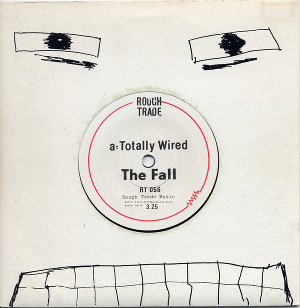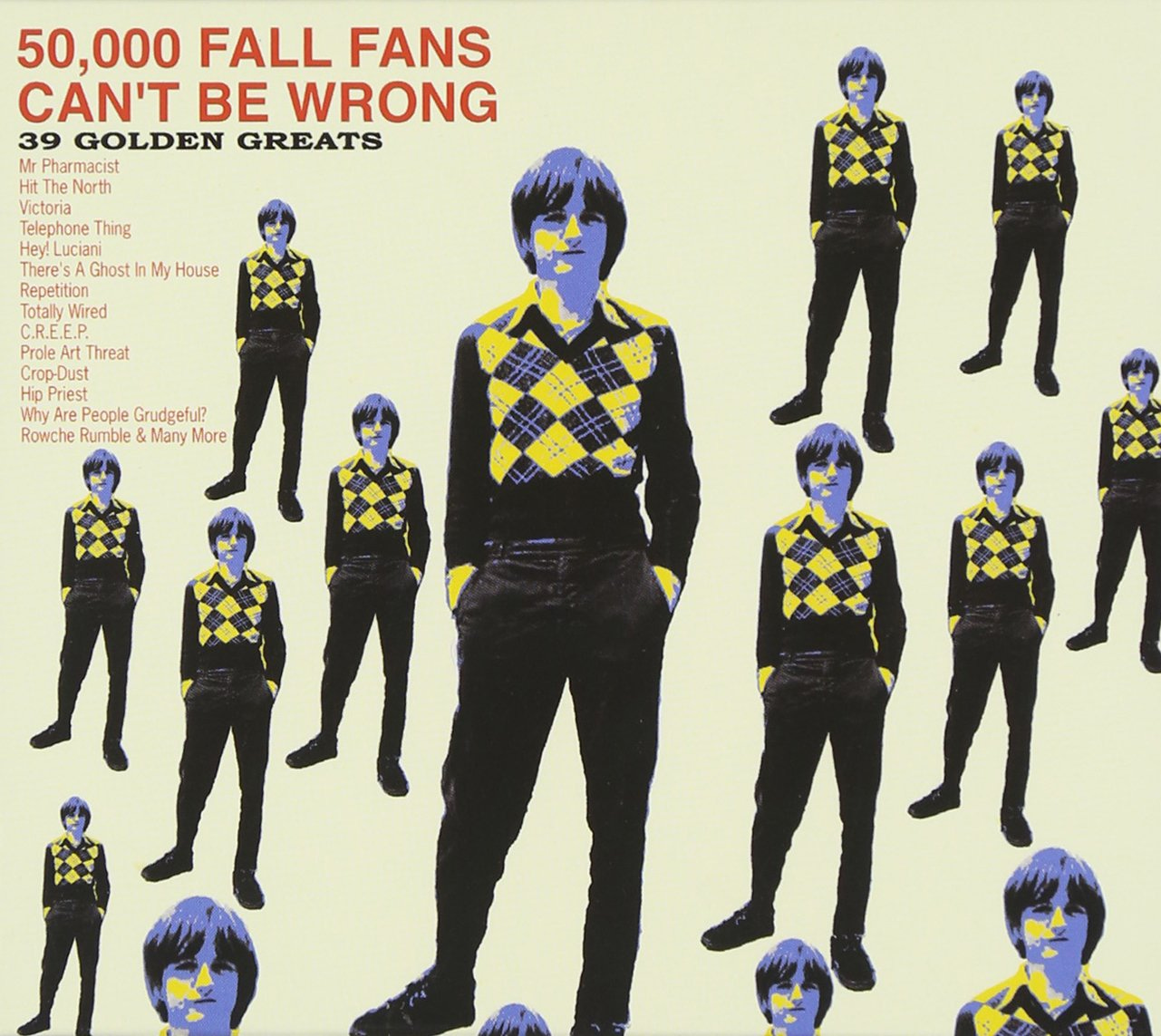You don’t have to be weird to be weird
Mark E. Smith sang with the voice of a drunk who’s been 86ed from a bar, braying his remonstrations from down the street. The Fall were for 40 prolific years as steadfastly individual a band as there’s been. The sound changed with its multiple lineups, but in front was always Smith — contrarian, caustic wit, absurdist poet, a post-punk Last Honest Man. "If it's me and your granny on bongos,” Smith said when asked about the 60-odd bandmembers that passed through the group, “It's The Fall.”
“We dig repetition in the music and we're never going to lose it” a young Smith speak-sings on The Fall’s 1979 debut Live At The Witch Trials, and he held to it — both repetition as a foundation of the band’s music and the one-note vocal style that made a weapon of his working class Mancunian snarl. The Fall formed after Smith saw the Sex Pistols at the Manchester Lesser Free Trade Hall. (Bands that sprang from the other 41 people there: The Buzzcocks, Joy Division/New Order, and The Smiths.) Songs like “Repetition” owe more to Krautrock bands like Can, however. (The most punk thing about the sweater-wearing Smith1 was his recalcitrance.) Where Can used repetition to hypnotic effect, The Fall’s induces tension and anxiety. That’s their 1981 song “Hip Priest” scoring the climax of Silence of the Lambs, for example. “Rock ‘n’ roll isn’t even music really,” Smith said. “It's a mistreating of instruments to get feelings over.”
“Totally Wired” is perhaps Smith’s most direct, literal song title; the feeling it gets over is of manic chemical overstimulation. For Smith, it was speed, which like a pint of Boddington’s, was to him a good working class drug, not like pot, which was for hippies, but the song’s coked-to-the-gills feeling is palpable even if you’ve never ventured past a double espresso. The 1980 song begins with a driving tom-tom beat and Smith’s uncharacteristically animated yelping of “I’m totally wired!” A half minute in, Steven Hanley’s circular bass line surges in the mix, swamping Smith’s vocals. Hanley was the longest tenured musician in The Fall and the one to receive the most credit from the generally uncharitable Smith, who said, “he is the Fall sound.” The tempo isn’t manic; the whole of the song feels like its out of control. As a guitar shrieks and shimmers in the background, Hanley’s otherwise nicely melodic bass line thumps like your heart as it's about to beat out of your chest.
Can't you see?
My butterfly stomach
Growls growls
I drank a jar of coffee
Then I took some of these
And now I'm totally wired.
“I drank a jar of coffee and then I took some of these” is just so good, perfectly evoking the sensation in few words. It’s something you’d say in the back of an ambulance as an EMT shines a penlight at your pupils. “My butterfly stomach growls growls” is like something from a toddler. Smith’s lyrics can be inscrutable to all but those attuned to the details of Northern Victorian architecture, regional slang, British politics, seaport shipping, the historical import of certain Manchester street corners, William of Orange, mistrust of London, English football, HP Lovecraft, and the perfidies of the music business. His fractured syntax can also make them seem tossed off, but his words are akin to William S. Burroughs’ tape cut ups, cracked but carefully considered combinations to provoke feelings otherwise sheltered by the conventions of language.2 The song is also an answer to the tacit question, “why are you like this?” (Answer: “I’m always worried.”) Then again, the question to the audience inherent in any provocational art is “why are you like that?”
The song was The Fall’s first sort-of hit single, and it's since been included on any number of punk, post-punk, and new wave compilations, something which Smith naturally hated. He was suspicious of music scenes and refused to socialize with anyone who was a part of one, even members of his own band. Smith claimed he only fired about half of The Fall’s 60 members (offenses included eating a salad and dancing to a song by The Clash) and that the others, including wives and girlfriends, left of their own accord. Both this turnover and the threat of it were intentional. For 32 studio albums, this “creative tension” kept the band in the only place where it could exist, on the edge. As legendary BBC Radio 1 DJ John Peel3 said of The Fall, his favorite band, “They are always different, they are always the same.”
Smith lived most of his life in Prestwich, a suburb of Manchester, the world’s first industrialized city and home of the “satanic mills” of the William Blake poem Smith appropriated for “Dog Is Life/Jerusalem.” The family home stood behind the town’s largest employer, the Prestwich Mental Hospital, which when it was known as Second Lancashire County Lunatic Asylum, was the largest such asylum in Europe. A girlfriend and an initial member of The Fall, Una Baines4, worked there as a nurse. Smith would sometimes pop around to sneak patients out to the pub. “I used to be psychic,” he said, “but I drank my way out of it.”
The Fall is named for Albert Camus’s final novel, where the protagonist reflects on his life to a stranger at a bar, revealing his method for enduring the suffering in a world that, without objective truth, is ultimately meaningless. Smith was cantankerous, belligerent, and impossible to be around for too long, but he remained uncompromisingly true to “Repetition,” a young man’s manifesto, to the end. Not to many, but to some — enough — The Fall means something. Who needs objective truth when you have your own?
14 Song Playlist
A brief survey of, to borrow the title of their seventh studio album, The Wonderful and Frightening World of The Fall.
“Totally Wired” Live in New York, 1981
This live version is at a faster tempo, as songs played live generally are, and Marc Riley’s guitar is louder in the mix, but it’s also notable as a good example of Smith vocal tic of adding “-ah” at the end of words: “Weird-ah to be wired-ah!” Note to Hunter S. Thompson fans: Smith improvs “when the going gets weird, the weird turn pro.”
86ed
To 86 someone is bartender slang for throwing someone out. It stems from restaurant term to be out of something (“86 the tuna tartare from the menu”) possibly because 86 rhymes with “nix.” I should have chosen an easier, widely known word, but using the jarring. highly specific term felt too true to Mark E. Smith and The Fall. For better and worse, I seem to write like the music feels.
Thank You
Thanks for reading. If you could click the “like” button, that helps the newsletter find people who might also enjoy it. And please share with some friends if you care to.
Scott
Guitarist Marc Riley, who was in the “Totally Wired” era lineup, was fired after one of several arguments an Australian tour led to a fist fight. Riley's subsequent band The Creepers wrote a song addressing both being sacked and Smith’s fashion sense, "Jumper Clown."
e.g. The Fall’s 1983 album Perverted by Language
Peel was an original BBC Radio 1 DJ. He was on the air from 1967 until his death in 2004, and his “Peel Sessions,” four songs recorded live in the BBC Studios, gave many bands their first national exposure. (The Fall recorded four.) He was known for his eclectic mix of music. Fellow BBC DJ Paul Gambaccini described Peel as "the most important man in music for about a dozen years."
Barnes went on to form the very good band Blue Orchids with founding The Fall guitarist Martin Bramah, the only real band of note to come from The Fall.




An old fraternity brother and friend of mine, Dave G., turned me on to your musings and
nice to see this....keep up the great work!
“Rock ‘n’ roll isn’t even music really,” Smith said. “It's a mistreating of instruments to get feelings over.” What a quote! Great post, Scott!